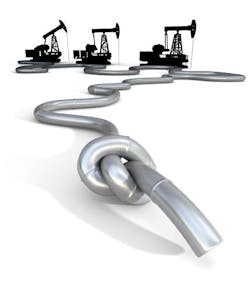“The [President Barack Obama] administration says it supports more oil and natural gas development here in the United States, then at every turn discourages it,” said Jack Gerard, president of the Washington, D.C.-based American Petroleum Institute (API, www.api.org), in a March 21 public statement.
Motivating Gerard was Obama’s mid-March trip to Brazil. There, the President committed $2 billion of U.S. aid to finance Brazil’s offshore exploration. He also committed to buy Brazilian crude. “It is beyond comprehension the administration would encourage trade for Brazilian oil while obstructing U.S. oil and natural gas development [and] eliminating related jobs here at home,” Gerard also said.
“The delays in trying to get us back to work—getting permits and what we need to bring production on—have been very harmful,” adds Rayola Dougher, an API senior economist. She notes the president opened new areas to production in 2010 that since have been withdrawn. “What the government has done is a pattern of delay and denial, which is having a cumulative negative effect on our ability to operate and produce,” she said. An example she gives: 2011 could be the first year since 1957 when there’ll be no lease sale in the Gulf of Mexico.
The government also now criticizes industry’s development of existing leases. In a March 2011 report—“Oil and Gas Lease Utilization: Onshore and Offshore: Report to the President”—Secretary of the Interior Ken Salazar scolded oil companies for having many inactive or idle leases. Responding publicly and immediately, Erik Milito, API director of upstream and industry operations, said: “The report completely whitewashes the fact that in many cases, the reason these leases have no exploration plans is that BOEMRE [Bureau of Ocean Energy Management, Regulation and Enforcement] is sitting on those plans.”
“We’re very disappointed with the Interior Department’s characterization of the permits we already have,” Dougher says. “They know better. If you’re not drilling, it’s called idling—plus it takes time to get exploration going.” She notes that, typically, each lease’s term is five to 10 years for that reason.
Yet another government target exists, says Dougher. “The proposed oil pipeline [TransCanada’s Keystone Gulf Expansion Project (Keystone XL)] from Canada to the Gulf of Mexico refineries could bring 1,000,000 barrels a day. The refineries are already configured to refine the heavy sour [sulfur-laden] oil [from the tar sands in Alberta],” Dougher explains. But, as of early April, even though 10 federal agencies took more than three years for environmental review of the project, “it’s being held up by the State Department. They’re requiring a second review,” she says. That agency expects a final decision before year’s end.
Quicker action needed
Absent inhibiting policies, though, could America supply its needs with its own oil reserves? “We could go a lot farther,” Dougher believes. Presently, 40 percent of America’s liquid fuel comes from foreign non-Canadian sources, 12 percent from Canada and 4 percent from biofuels, she states.
“But Canada could provide up to 5 million barrels daily. And by 2030, we estimate that if we open up non-park federal lands onshore and offshore, that will provide 62 percent of our needs,” Dougher says. Biofuels such as ethanol and cellulosic ethanol could add another 13 percent by 2030, she suggests. Thus, with Canada’s contribution at 17 percent then, it’s possible 92 percent of America’s domestic crude needs would be met.
Time’s critical, though. “We would take a good five to ten years before the first production came online from any new lease that produces, given that only one of 100 will have economically and technically recoverable oil,” Dougher explains.
But potential higher federal taxes could cripple that effort and more. “We pay 48 percent, compared to the S&P [Standard & Poor Index] industries that pay only 28 percent,” Dougher says.
Taxing the oil industry more is very short-sighted, she believes. “In very short order, six or seven years, because the industry would not be investing that $90 billion [the amount currently being discussed from higher taxes], you’d be killing a lot of jobs and revenue.” Industry’s response is simple: “Don’t do that. We’ll bring more revenue,” she states.
“If we want to, America can really change this current energy picture. It’s all about government policy,” Dougher stresses. “You don’t have economic growth without energy, though. But if you make energy too expensive, you have less growth, jobs, income, economic growth and tax revenues—all the good things you can get from the energy.” Misguided and/or ill-considered government policy arrests those things.
C. Kenna Amos, [email protected], is an Automation World Contributing Editor.
American Petroleum Institute (API, www.api.org)
May 2011, Related Perspective – Exxon Expands Drilling
To read the perspective, visit http://www.automationworld.com/feature-8736
About the Author
C. Kenna Amos
Contributing Editor

Leaders relevant to this article:
